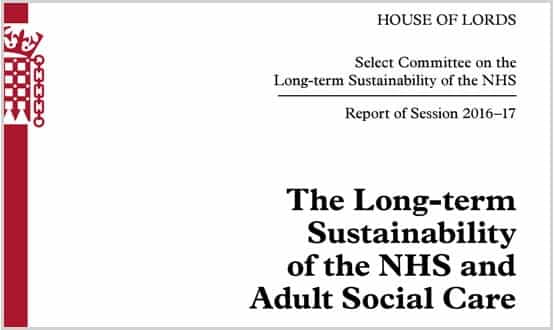Select committee criticises lack of consistent strategy in health IT
- 17 April 2017

A House of Lords select committee has published a highly critical report on the state of NHS health IT, saying there is a “worrying absence of credible strategy to encourage uptake”.
The document, released on 5 April and produced by the select committee on the long-term sustainability of the NHS, expressed concerns about the lack of unity and direction for NHS health technology.
“There is a worrying absence of a credible strategy to encourage the uptake of innovation and technology at scale across the NHS”, members of the committee said. “It is not clear who is ultimately responsible for driving innovation and ensuring consistency in the assessment and the adoption of new technological approaches.”
The report argued organisations which fail to adapt to technology should be punished financially. “Make it clear that there will be funding and service delivery consequences for those who repeatedly fail to engage.”
It suggested this could involve relocating services to places that prove to be more technologically innovative.
The select committee also said the “testing and adoption of new health technologies should be formally integrated into medical and non-medical NHS leadership, education and training at all levels”.
In so doing, members seemed to favour recommendations that Robert Wachter made in his study of NHS IT, published last September.
In the Wachter Review, he said there was a deficit of trained leaders in clinical care and informatics, and recommended workforce development. Last month NHS England announced it was setting up an NHS Digital Academy to train 300 NHS staff to become “digital leaders” by 2021.
The select committee’s report also touches on the failure of the £7.5 million care.data project that intended to create a giant database of patient records.
Andy Williams, then chief executive of NHS Digital, told the committee that “care.data, in part, failed through a lack of public trust in the use of the data that was going to be generated”.
“We have to convince the public that we are doing the right thing and involving them and asking them.”
The report said the failure of care.data “illustrates the inevitable consequences of failing to grapple with important issues relating to personal privacy”, and argued NHS Digital and those involved in data sharing within the NHS should engage the public in any future endeavours in this area.





7 Comments
Sorry guys, huff and puff all you like but the failure is the health technologists’. Solicitors and architects etc changed practice because someone came to them with tools which met their needs, matched their governance requirements, improved their efficiency and saved them money. A no-brainer to adopt them and so they did. Where is this in health?
If there is a vacuum of leadership on IT is a side-effect of the chaos caused by Lansley’s Health & Social Care Act. Top level governance across the NHS is shot, and NHS Digital is as much a victim of that.
The idea of punishing organisations for failing to adopt technology is clearly the ramblings of some senile ‘hang em and flog em’ grandee. If organisations don’t see any benefit for themselves from investing in IT, then they won’t do it. The problem has always been the tension between narrow organisational needs and investment priorities and those of the wider health economy, and which of these takes precedence.
NPfIT tried to prioritise the national health economy and failed to get buy-in from local organisations. The 2012 Act encouraged the prioritisation of the local with strategic incoherence the predictable consequence, both in IT and elsewhere.
I would agree if the NHS had not failed to address even the most basic of technologies and processes. Something as simple as email has yet to be adopted at scale in most organisations who still rely heavily on paper, post and faxes.
There is also a huge and unnecessary amount of resistance to change. I have lost count of the number of times I have heard managers resist change on the basis of “not everyone has broadband” or “information governance”.
Strong leaders should be driving change on a continuous ad iterative basis and this is not happening in many places.
I am the best person to check my SCR.
I agree the NHS has a serious problem recruiting fresh talent and retaining them nevermind enabling them to flourish. The “old boy’s health informatics club” who scoff ahttps://www.digitalhealth.net/2017/04/select-committee-criticises-lack-of-consistent-health-it-strategy/#respondt the idea of being able to communicate with patients via email nevermind anything more innovative ultimately hold back progress and cost the NHS dearly.
That’s not to say they are all like that, but there is a great deal of resistance to change and a huge mindset problem in many ranks which needs to be weeded out by some strong and assertive leaders.
It’s as much a problem with management and senior clinicians. There are too many conflicts of interests especially with GPs where there is far too little understanding of even the basics of Data Protection nevermimd technology and innovation. At even the most baisc level many GPs and NHS works still use paper, post and fax over email just because they have such a poor grasp on the basics of what is legal and possible or purely because they are resistant to change.
Consider this … just who is the best person to check a person’s SCR ?
I would also add, in my personal opinion, it’s not the young people messing things up, quite the opposite, it’s the older leaders !
Personal privacy should not be in the domain of young IT personnel who are boffins first and sensitive to patient confidentiality and the devastating results of releasing unsound, unchecked SCRs, second. This was a disaster waiting to happen. Everyone should read Dr Neil Bhatia’s websites on opt out. Why it should be such a labyrinthine process only demonstrates how unfit for purpose the whole sorry saga has been. Unfortunately for some, the damage has irretrievably been done. I personally only wish more GPs had done the decent thing and prevented their patient data from leaving their premises, devices. They have put other interests over and above patient confidentiality, duty of care etc. This mess warranted a vote more than did Brexit. No wonder NHS Digital is more like a secret society now; the cat is chewing its way slowly out of the bag. But as stated previously, it’s the government stoopid, and it would be the NHS investigating themselves, an invitation to close ranks.
Comments are closed.